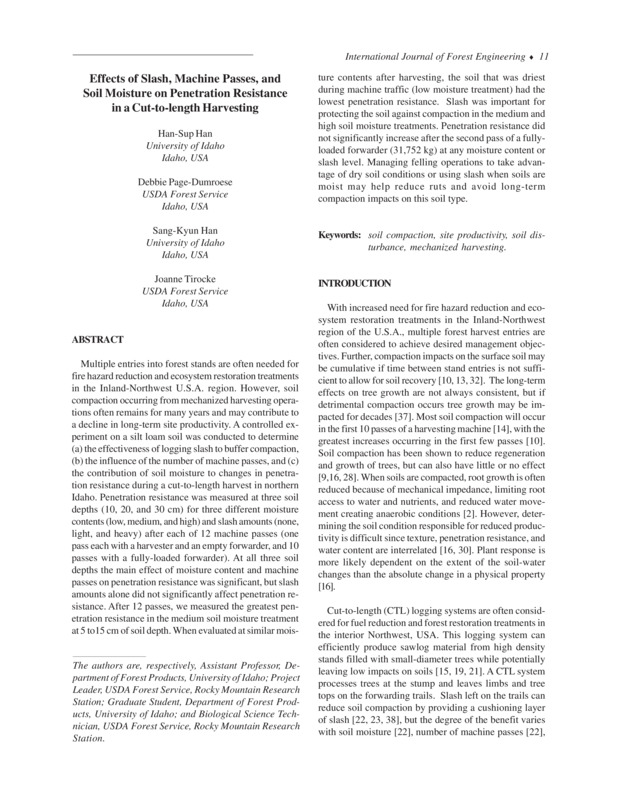PDF
Effect of Slash, Machine Passes, and Moisture Content on Penetration Resistance in a Cut-to-Length Harvesting Item Info
- Title:
- Effect of Slash, Machine Passes, and Moisture Content on Penetration Resistance in a Cut-to-Length Harvesting
- Creator:
- Han, Han-Sup; Page-Dumroese, Debbie; Han, Sang-Kyun; Tirocke, Joanne
- Date Created:
- 2006
- Description:
- Multiple entries into forest stands are often needed for fire hazard reduction and ecosystem restoration treatments in the Inland-Northwest U.S.A. region. However, soil compaction occurring from mechanized harvesting operations often remains for many years and may contribute to a decline in long-term site productivity. A controlled experiment on a silt loam soil was conducted to determine (a) the effectiveness of logging slash to buffer compaction, (b) the influence of the number of machine passes, and (c) the contribution of soil moisture to changes in penetration resistance during a cut-to-length harvest in northern Idaho. Penetration resistance was measured at three soil depths (10, 20, and 30 cm) for three different moisture contents (low, medium, and high) and slash amounts (none, light, and heavy) after each of 12 machine passes (one pass each with a harvester and an empty forwarder, and 10 passes with a fully-loaded forwarder). At all three soil depths the main effect of moisture content and machine passes on penetration resistance was significant, but slash amounts alone did not significantly affect penetration resistance. After 12 passes, we measured the greatest penetration resistance in the medium soil moisture treatment at 5 to15 cm of soil depth. When evaluated at similar moisture contents after harvesting, the soil that was driest during machine traffic (low moisture treatment) had the lowest penetration resistance. Slash was important for protecting the soil against compaction in the medium and high soil moisture treatments. Penetration resistance did not significantly increase after the second pass of a fully loaded forwarder (31,752 kg) at any moisture content or slash level. Managing felling operations to take advantage of dry soil conditions or using slash when soils are moist may help reduce ruts and avoid long-term compaction impacts on this soil type.
- Document Type:
- Research
- Subjects:
- Flat Creek soil compaction harvest impacts logging impacts North Idaho soils cut-to-length forest operations
- UIEF Unit:
- Flat Creek
- Stand Number:
- 102
- Location:
- UIEF; Flat Creek
- Latitude:
- 46.851008
- Longitude:
- -116.769498
- Publisher:
- International Journal of Forest Engineering
- Department:
- Department of Forest Products
- Source:
- International Journal of Forest Engineering 17(2): 11-17. From Treesearch, USDA Forest Service, https://www.fs.usda.gov/research/treesearch/43442
- Type:
- Text
- Format:
- application/pdf
Source
- Preferred Citation:
- "Effect of Slash, Machine Passes, and Moisture Content on Penetration Resistance in a Cut-to-Length Harvesting", UIEF Research Exchange, University of Idaho Library Digital Collections, https://www.lib.uidaho.edu/digital/uief/items/uief_0013.html
Rights
- Rights:
- In copyright, educational use permitted.
- Standardized Rights:
- http://rightsstatements.org/vocab/InC-EDU/1.0/

